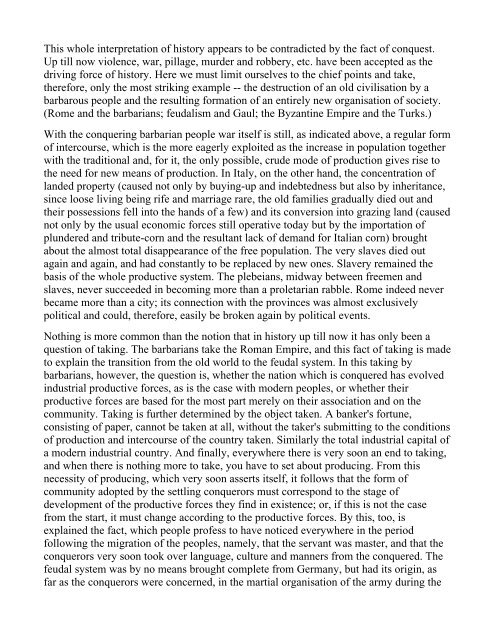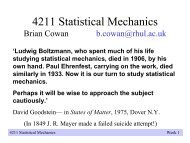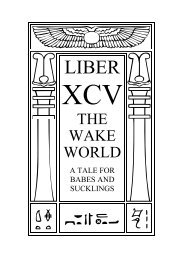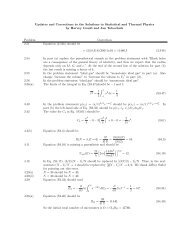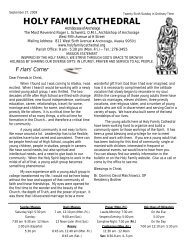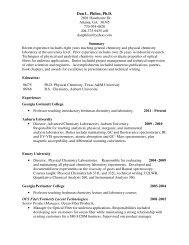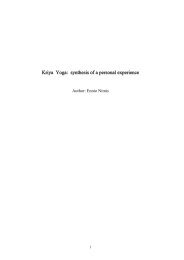A Critique of The German Ideology
A Critique of The German Ideology
A Critique of The German Ideology
You also want an ePaper? Increase the reach of your titles
YUMPU automatically turns print PDFs into web optimized ePapers that Google loves.
This whole interpretation <strong>of</strong> history appears to be contradicted by the fact <strong>of</strong> conquest.<br />
Up till now violence, war, pillage, murder and robbery, etc. have been accepted as the<br />
driving force <strong>of</strong> history. Here we must limit ourselves to the chief points and take,<br />
therefore, only the most striking example -- the destruction <strong>of</strong> an old civilisation by a<br />
barbarous people and the resulting formation <strong>of</strong> an entirely new organisation <strong>of</strong> society.<br />
(Rome and the barbarians; feudalism and Gaul; the Byzantine Empire and the Turks.)<br />
With the conquering barbarian people war itself is still, as indicated above, a regular form<br />
<strong>of</strong> intercourse, which is the more eagerly exploited as the increase in population together<br />
with the traditional and, for it, the only possible, crude mode <strong>of</strong> production gives rise to<br />
the need for new means <strong>of</strong> production. In Italy, on the other hand, the concentration <strong>of</strong><br />
landed property (caused not only by buying-up and indebtedness but also by inheritance,<br />
since loose living being rife and marriage rare, the old families gradually died out and<br />
their possessions fell into the hands <strong>of</strong> a few) and its conversion into grazing land (caused<br />
not only by the usual economic forces still operative today but by the importation <strong>of</strong><br />
plundered and tribute-corn and the resultant lack <strong>of</strong> demand for Italian corn) brought<br />
about the almost total disappearance <strong>of</strong> the free population. <strong>The</strong> very slaves died out<br />
again and again, and had constantly to be replaced by new ones. Slavery remained the<br />
basis <strong>of</strong> the whole productive system. <strong>The</strong> plebeians, midway between freemen and<br />
slaves, never succeeded in becoming more than a proletarian rabble. Rome indeed never<br />
became more than a city; its connection with the provinces was almost exclusively<br />
political and could, therefore, easily be broken again by political events.<br />
Nothing is more common than the notion that in history up till now it has only been a<br />
question <strong>of</strong> taking. <strong>The</strong> barbarians take the Roman Empire, and this fact <strong>of</strong> taking is made<br />
to explain the transition from the old world to the feudal system. In this taking by<br />
barbarians, however, the question is, whether the nation which is conquered has evolved<br />
industrial productive forces, as is the case with modern peoples, or whether their<br />
productive forces are based for the most part merely on their association and on the<br />
community. Taking is further determined by the object taken. A banker's fortune,<br />
consisting <strong>of</strong> paper, cannot be taken at all, without the taker's submitting to the conditions<br />
<strong>of</strong> production and intercourse <strong>of</strong> the country taken. Similarly the total industrial capital <strong>of</strong><br />
a modern industrial country. And finally, everywhere there is very soon an end to taking,<br />
and when there is nothing more to take, you have to set about producing. From this<br />
necessity <strong>of</strong> producing, which very soon asserts itself, it follows that the form <strong>of</strong><br />
community adopted by the settling conquerors must correspond to the stage <strong>of</strong><br />
development <strong>of</strong> the productive forces they find in existence; or, if this is not the case<br />
from the start, it must change according to the productive forces. By this, too, is<br />
explained the fact, which people pr<strong>of</strong>ess to have noticed everywhere in the period<br />
following the migration <strong>of</strong> the peoples, namely, that the servant was master, and that the<br />
conquerors very soon took over language, culture and manners from the conquered. <strong>The</strong><br />
feudal system was by no means brought complete from <strong>German</strong>y, but had its origin, as<br />
far as the conquerors were concerned, in the martial organisation <strong>of</strong> the army during the


